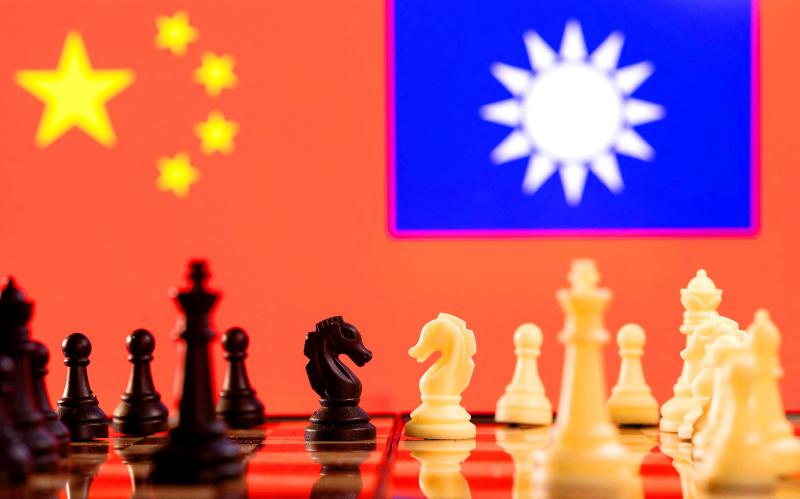China has changed tactics in its cognitive warfare campaign against Taiwan, now favoring divisive negative stories about Taiwanese society, rather than positive stories about China, an Academia Sinica researcher wrote in a recently published paper.
“In the past, when its economy was strong, China liked to use positive propaganda, including proposing a number of incentives and measures to attract Taiwanese,” Hung Tzu-wei (洪子偉), an associate research fellow at the academy’s Institute of European and American Studies, said on Friday.
However, with its economy disrupted by the US-China trade war, the COVID-19 pandemic and other factors, China has gradually turned toward “mobilizing negative sentiment,” for example, by spreading false reports on key social issues to divide Taiwanese, he said.

Photo: Reuters
It also creates negative sentiment and division through unilateral actions, such as banning imports of Taiwan’s agricultural products, he said.
Hung, who also conducts research for the Institute for National Defense and Security Research, analyzed data collected over two years from China’s cognitive warfare efforts against Taiwan, using the data to make predictions about China’s actions and ways to counter those actions.
His research was compiled into a paper published on July 19 in Oxford University’s Journal of Global Security Studies.
In his research, Hung found that even among people who reject fake news stories, there is still an impact through the energy spent on the cognitive processing of the false information.
Some of the disinformation created by Chinese content farms includes stories that aim to cause animosity toward the US, for example, by emphasizing incidents of racism toward minorities in the US, or by creating the narrative that the US turns its back on its allies, he said.
Hung said social media could affect China’s efforts in both positive and negative ways.
For example, young people in Taiwan are more media literate and able to see through Chinese propaganda — often using it as content for memes to satirize it, he said.
On the other hand, Taiwanese youth often access content through Chinese Web sites, or use Chinese social-media platforms like Tik Tok, which puts them at risk, he said.
“We should be vigilant, but not overly worried. Cognitive warfare is a good exercise for the immune system of a democracy,” he said.
Hung suggested the government combat China’s cognitive warfare efforts by improving transparency.
Citing examples, he said the Australian government regularly reports on the activities of foreign forces, requires academics and the media to disclose funding, and places restrictions on companies or media platforms that contravene fair competition.
“It is also important to fight back. China’s online cognitive warfare against Taiwan dropped sharply during its suppression of the Hong Kong pro-democracy movement,” he said.
“That means that China cannot win two cognitive wars at the same time,” he said.

Alain Robert, known as the "French Spider-Man," praised Alex Honnold as exceptionally well-prepared after the US climber completed a free solo ascent of Taipei 101 yesterday. Robert said Honnold's ascent of the 508m-tall skyscraper in just more than one-and-a-half hours without using safety ropes or equipment was a remarkable achievement. "This is my life," he said in an interview conducted in French, adding that he liked the feeling of being "on the edge of danger." The 63-year-old Frenchman climbed Taipei 101 using ropes in December 2004, taking about four hours to reach the top. On a one-to-10 scale of difficulty, Robert said Taipei 101

Nipah virus infection is to be officially listed as a category 5 notifiable infectious disease in Taiwan in March, while clinical treatment guidelines are being formulated, the Centers for Disease Control (CDC) said yesterday. With Nipah infections being reported in other countries and considering its relatively high fatality rate, the centers on Jan. 16 announced that it would be listed as a notifiable infectious disease to bolster the nation’s systematic early warning system and increase public awareness, the CDC said. Bangladesh reported four fatal cases last year in separate districts, with three linked to raw date palm sap consumption, CDC Epidemic Intelligence

US climber Alex Honnold left Taiwan this morning a day after completing a free-solo ascent of Taipei 101, a feat that drew cheers from onlookers and gained widespread international attention. Honnold yesterday scaled the 101-story skyscraper without a rope or safety harness. The climb — the highest urban free-solo ascent ever attempted — took just more than 90 minutes and was streamed live on Netflix. It was covered by major international news outlets including CNN, the New York Times, the Guardian and the Wall Street Journal. As Honnold prepared to leave Taiwan today, he attracted a crowd when he and his wife, Sanni,

Taiwanese and US defense groups are collaborating to introduce deployable, semi-autonomous manufacturing systems for drones and components in a boost to the nation’s supply chain resilience. Taiwan’s G-Tech Optroelectronics Corp subsidiary GTOC and the US’ Aerkomm Inc on Friday announced an agreement with fellow US-based Firestorm Lab to adopt the latter’s xCell, a technology featuring 3D printers fitted in 6.1m container units. The systems enable aerial platforms and parts to be produced in high volumes from dispersed nodes capable of rapid redeployment, to minimize the risk of enemy strikes and to meet field requirements, they said. Firestorm chief technology officer Ian Muceus said